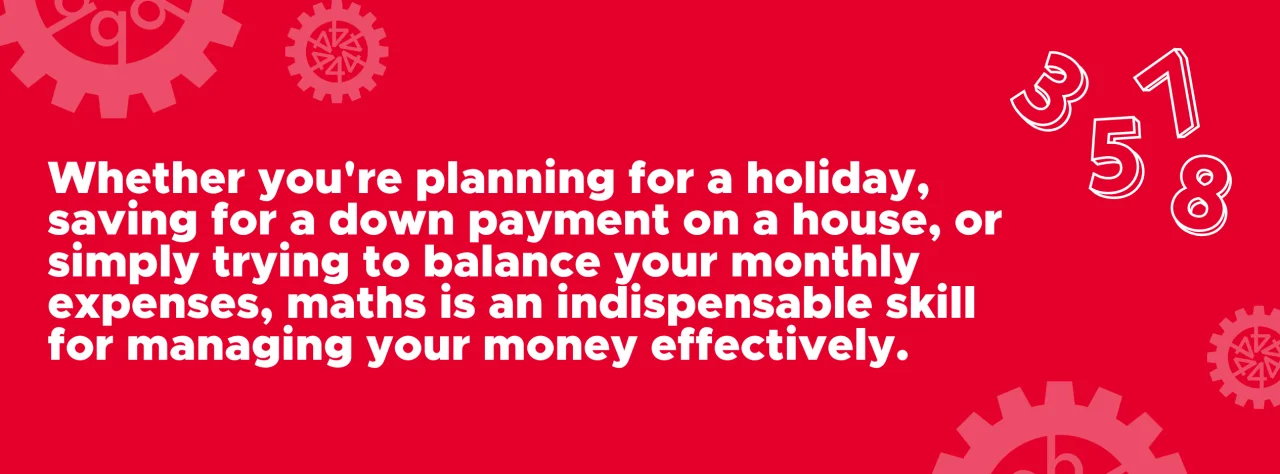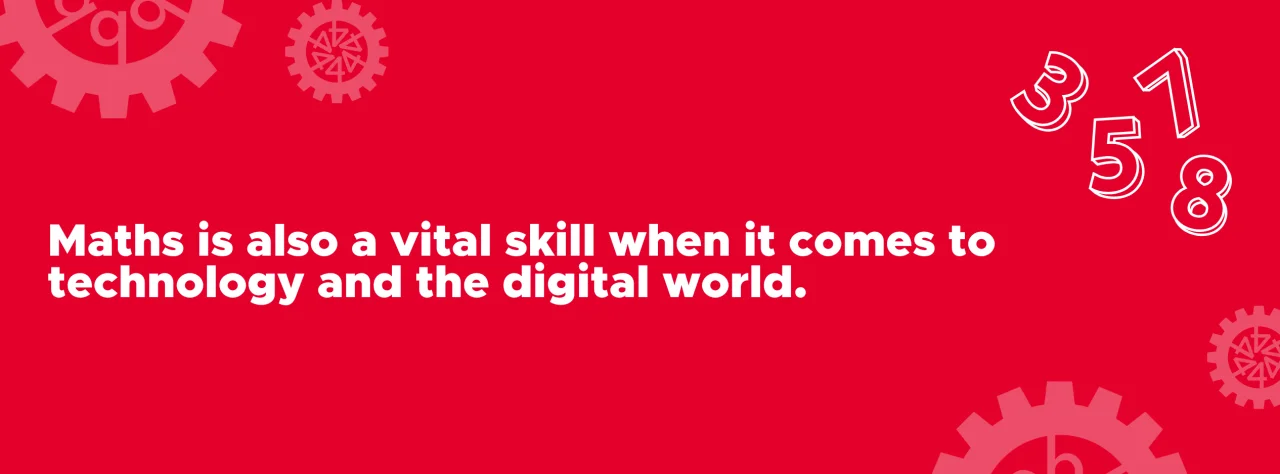10th February 2025
How Does Maths Impact Our Everyday Lives?
Mathematics is often seen as a subject confined to classrooms or specific industries like engineering or technology. However, the truth is that maths plays a significant role in almost every aspect of our daily lives, even when we don’t realise it. Whether you’re a student, a professional, or simply someone going about their daily routine, maths is there, shaping decisions, guiding actions, and helping us navigate the world. From managing finances to making informed choices, maths provides the tools needed for survival, success, and well-being.
This blog will explore how much maths impacts our daily lives, so that you can help show and encourage your child to continue persevering in maths, as what they are currently learning will become a crucial part of their adult lives.

How Maths Is Used In Other School Subjects
Mathematics plays a crucial role in a wide range of school subjects beyond just the traditional maths classes. In fabric technology, maths helps with measurements, pattern making, and calculating fabric requirements for projects. In art, geometric principles are applied in creating shapes, symmetry, and perspective in visual compositions. Photography relies on maths for understanding camera settings like exposure, aperture, and shutter speed, while also using ratios and proportions to compose balanced images. Physical education benefits from maths when analysing data for fitness levels, calculating heart rates, and determining the best training intensities. In science, maths is integral for data collection, analysis, and understanding concepts like force, motion, and chemical reactions. By connecting maths to these diverse subjects, students gain a deeper appreciation of its practical applications in everyday life and creativity.
The Role of Maths Across Professions
Consider the professionals we interact with every day - doctors, teachers, engineers, shopkeepers, and even lawyers. Each of these roles, regardless of how specialised or unique they may seem, requires a solid understanding of maths. For example, doctors rely on maths when calculating the proper dosage of medication for a patient. If they need to administer 150 milligrams of a specific medicine, but it only comes in 50 milligram tablets, the doctor must use basic division to determine that three tablets are required. It may seem like simple arithmetic, but these calculations can be the difference between a successful treatment and a potentially harmful error.
Similarly, in the legal field, lawyers and paralegals must apply maths in ways that go beyond basic calculations. They may need to calculate damages in a personal injury case, estimate costs in a business contract, or even analyse statistical data to support their arguments. In fact, a thorough understanding of numbers is essential for any lawyer, as they work with contracts, financial data, and even taxes - areas where precise numerical understanding can be the key to their clients’ success.
In the world of education, maths is just as indispensable. Teachers need to balance schedules, plan lessons, manage classroom resources, and assess student performance - tasks that all require some level of mathematical thinking. Whether it's calculating the number of materials required for a project or interpreting test scores, maths ensures that educators can efficiently manage the logistics of the classroom while fostering learning.
It’s also impossible to ignore the role maths plays in retail. When you go to a store to buy a product, you may not realise it, but there are numerous mathematical calculations involved. Shopkeepers need to manage inventory, calculate discounts, apply sales tax, and determine the profitability of their business. Similarly, if you're a customer using a coupon or comparing prices, you're engaging in maths to make the most economical decision.

The Importance of Maths in Budgeting
Now, let’s talk about one of the most vital ways maths impacts us: budgeting. Whether you're planning for a holiday, saving for a down payment on a house, or simply trying to balance your monthly expenses, maths is an indispensable skill for managing your money effectively. Understanding how much money you need, how much you can save, and how to divide your funds into various categories (such as rent, utilities, groceries, and entertainment) requires basic mathematical skills.
Take saving for a holiday as an example. To save enough money, you must first determine how much your trip will cost. This involves doing maths to add up the cost of flights, accommodation, food, and activities. Then, you need to figure out how much you can set aside each month to reach your goal. This might sound straightforward, but it requires understanding percentages, working out interest rates, and managing different costs. Without these skills, it would be difficult to make sure you have enough funds to enjoy the trip without going into debt.
Likewise, buying a house is one of the most significant financial decisions many people will ever make, and it involves a great deal of mathematical thinking. Before you even step foot in a realtor’s office, you need to understand your financial situation, including your savings, monthly income, and current expenses. When applying for a mortgage, you'll need to calculate the amount you can borrow, what your monthly payments will be, and how much interest you'll pay over the life of the loan. Even after the house is purchased, you'll still need to use maths to calculate taxes, maintenance costs, and future home value projections.
Maths also helps people make informed decisions about paying bills. From utilities to credit card payments, knowing how to break down and understand your bills is crucial for maintaining financial health. For instance, if you’re paying your electricity bill, you might need to calculate how much you’re using during certain periods of the day and what impact that has on your overall costs. Understanding unit rates and interpreting different charges on a bill all require mathematical skills.
Maths in Marketing and Business
In marketing, maths is a critical tool for budgeting and strategising campaigns. Whether you are a small business owner or a large corporation, knowing how to allocate funds for advertising, measure return on investment (ROI), and analyse data to improve customer targeting are all tasks that require mathematical skills. In fact, marketing has become increasingly data-driven, meaning professionals must be adept at analysing trends, forecasting outcomes, and measuring success - all of which require maths.
As marketing has moved into the digital age, the role of maths has only grown. For instance, marketers today often use algorithms to track customer behaviour and adjust their advertising strategies accordingly. They might look at data on customer purchases, website traffic, or social media interactions to make informed decisions on where to allocate their marketing budget. Without maths, it would be impossible to interpret such data and tailor campaigns to maximise success.

Everyday Life and the Role of Maths
Maths is also a vital skill when it comes to technology and the digital world. For example, when using apps, whether for shopping, tracking health, or managing your calendar, there’s maths at play behind the scenes. Algorithms that power these apps rely on mathematical principles to analyse data and predict behaviours. Whether it’s a recommendation for your next favourite book on an online store or an advertisement tailored to your browsing habits, maths is what makes these personalised experiences possible.
And even beyond the professional world, maths impacts our daily lives in less obvious ways. For instance, when cooking, we rely on maths to adjust recipes based on the number of servings we need, or when comparing prices at the grocery store, we might calculate unit prices to find the best deal. Time management, navigating traffic, and even planning a route for a road trip - each of these tasks involves maths in some form.
Conclusion
We hope this blog has given you valuable insight into how maths is an essential tool we use in our everyday lives, across all professions, worldwide. In order to function and thrive, it is essential that we all have a good understanding of at least the basics of maths. Here at NumberWorks'nWords, we understand the importance of maths and are determined to help every child that enters our centres succeed, in the classroom and beyond. If you feel like your child might need some extra support, we are here to help. Book now for a FREE, no-obligation learning assessment.
A small amount of work now will help your child immensely in the future.

More news articles
18th February 2026

The Stress-Free Guide to Learning Times Tables
Read more3rd February 2026

How NumberWorks’nWords Helps Children Reset After the Holidays
Read more18th January 2026

How to Reset Routines After the Christmas Holidays
Read more5th December 2025

How to Prevent the Summer Learning Slide
Read more